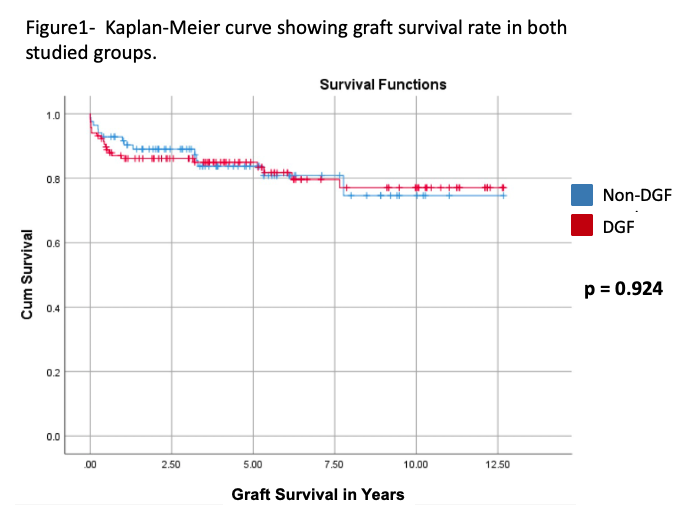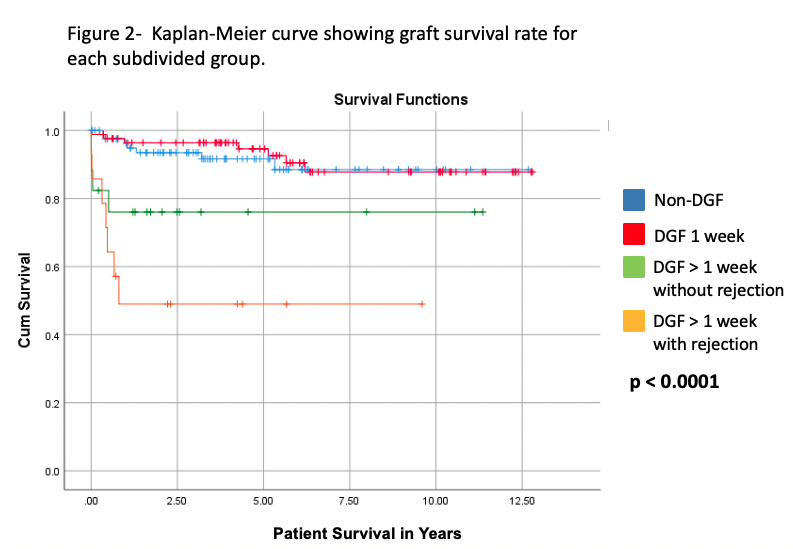Impact of Delayed Graft Function in Donation After Circulatory Death Kidney Transplantation
1Urology, Western University, London, ON, Canada, 2Division of Urology, Department of Surgery, University of Alberta, Edmonton, AB, Canada
Meeting: 2022 American Transplant Congress
Abstract number: 731
Keywords: Donors, non-heart-beating, Graft survival, Rejection, Renal function
Topic: Clinical Science » Kidney » 32 - Kidney Deceased Donor Selection
Session Information
Session Name: Kidney Deceased Donor Selection
Session Type: Poster Abstract
Date: Saturday, June 4, 2022
Session Time: 5:30pm-7:00pm
 Presentation Time: 5:30pm-7:00pm
Presentation Time: 5:30pm-7:00pm
Location: Hynes Halls C & D
*Purpose: Donation after circulatory death (DCD) has been associated with higher rates of delayed graft function (DGF) when compared to donation after brain death (DBD). Although DGF has been associated with inferior transplant outcomes in DCD transplants, presence of DGF on DCD kidneys is unclear. We examine the impact of DGF in the setting of DCD on transplant outcomes.
*Methods: Between July 2006 and January 2019, we analyzed 201 single DCD transplants. DGF was defined as the requirement for dialysis within the first 7 days of transplantation. Assessment of donor and recipient demographics including sensitization, and immunotherapy was performed. Kaplan-Meier analysis was performed to assess the impact of DGF on overall graft and patient survival. Outcome variables such as Creatinine Clearance (CrCl), readmission rate and rejection were compared between groups using the Student t-test and the Pearson chi-square test.
*Results: Overall, 58% of DCD renal transplants experienced DGF. Other than a higher acute rejection rate in the DGF (p<0.03), the DGF and no-DGF groups were demographically similar. The presence of DGF did not affect patient or graft survival after a mean of 6 years (1-12 years). Even when we assessed expanded criteria DCD transplants, DGF did not have an impact upon graft survival (p = 0.55). Although the presence of DGF affected CrCl at 1(p<0.0001, 95% confidence interval 14.5 - 30.8), and 3 months (p<0.003, 95% confidence interval 4.5 - 21.7), 1 year Cr Cl was not different in the group with DGF vs. no DGF (p = 0.65). Although DGF increased the length of hospitalization, it did not affect re-admission rates (X2=1.04, p = 0.31). Importantly, prolonged DGF (>1 week), associated with rejection led to poor graft survival compared with DGF without rejection (p<0.0001).
*Conclusions: Overall, DGF had no impact on graft or patient survival in DCD transplantation. The rejection rates were higher in the DGF group, with poor outcomes in the group with prolonged DGF. This highlights the importance of weekly surveillance biopsies in patients with prolonged DGF until patients resume dialysis independence.
To cite this abstract in AMA style:
Offerni JMello, Brar H, Lee D, Levine M, Mandurah M, Rim S, Sener A, Luke P. Impact of Delayed Graft Function in Donation After Circulatory Death Kidney Transplantation [abstract]. Am J Transplant. 2022; 22 (suppl 3). https://atcmeetingabstracts.com/abstract/impact-of-delayed-graft-function-in-donation-after-circulatory-death-kidney-transplantation/. Accessed February 1, 2026.« Back to 2022 American Transplant Congress


